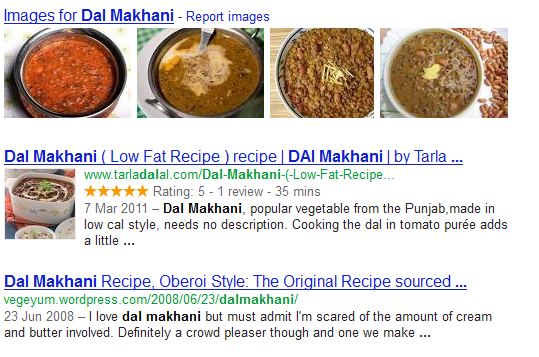Google rich snippets as most webmasters probably know by now are small amounts of code that allow Google to present more information regarding a website in the search results. The most common and obvious application of this is with reviews. Here Google hoped to allow site owners to include star ratings for products and services with the intention of giving the viewer more information to base their choices on.
So for instance if you were to search for a specific type of product, you would then be able to see a star rating next to those products giving you a quick consensus of what people think about them. For the visitors this is useful, allowing them to quickly skim through the results, and for the webmasters it would potentially result in a better click through rate according to Google as people would quickly spot which products they wanted and which they didn’t, and as they were attracted to shiny five star ratings.
Of course webmasters cottoned onto this potential pretty fast, and it wasn’t long before every single product and service had a five star rating – of course written by the site owners and not really providing the viewer with much insight.

The Downside of Google Rich Snippets
For the most part then, these snippets are good news for webmasters and just another system for them to take advantage of in order to get a stronger foothold on the net. However, could it be possible that in some cases the rich snippets do more harm than good? Is this something that is suitable for every kind of online business?
The obvious answer for companies that are doing this the honest way is that rich snippets won’t always be good news – as they will sometimes include bad reviews. Of course, most savvy web owners will just alter this with a little code or by writing some dummy reviews, but even in other cases will this always increase CTR?
In the case of review sites, it’s very possible to argue no. Think about it – if you run a review site such as IMDB or Rotten Tomatoes, then do you really want people to see your star rating before they’ve even clicked on your site? Isn’t that kind of like letting people read your punch line before you’ve told them the setup of the joke?

Now I’m not the kind of person that trusts critics when it comes to film reviews, but I know plenty of people who will base their viewing habits entirely on how many stars a film has. So if they can do that without even reading the review, you better believe that’s what they’re going to do. When you consider that all Rotten Tomatoes does is to provide an aggregate score, then really this is no different from just typing in ‘The Hangover 2’ and then scrolling down to see all of the star ratings.
The Wider Problem
This of course isn’t just a problem for film review sites, but for any sites that provide aggregates and reviews as their main value. In such cases it might be worth simply removing those rich snippets from your site.
But could it also be possible that something even more sinister is at play here (cue organ music)? Seeing as Google is aiming to start providing direct answers to questions via its semantic search algorithms, might it not be just a matter of time before they start taking the aggregate scores from all the rich snippets themselves? Google could theoretically become a MetaCritic for everything giving you a crowdsourced review of everything from restaurants to toys – leaving little need for people to visit the sites that publish the reviews at all.
Good job Google on your promise not to be evil…
This post was guest blogged by Jitendra Agrawal of Get Links Pro.
